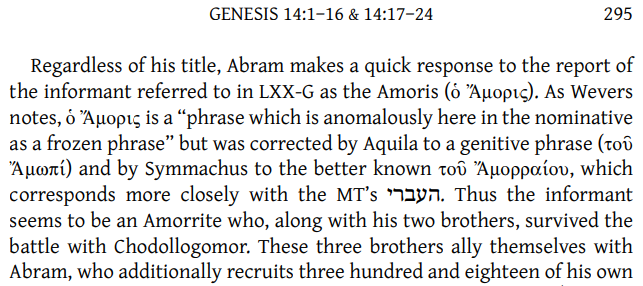Page 1 of 2
ὁ Αμορις in Gen 14:13
Posted: December 17th, 2023, 12:19 pm
by Mitch Tulloch
παραγενόμενος δὲ τῶν ἀνασωθέντων τις ἀπήγγειλεν Αβραμ τῷ περάτῃ αὐτὸς δὲ κατῴκει πρὸς τῇ δρυὶ τῇ Μαμβρη ὁ Αμορις τοῦ ἀδελφοῦ Εσχωλ καὶ ἀδελφοῦ Αυναν οἳ ἦσαν συνωμόται τοῦ Αβραμ
Although the NETS LXX translates this mechanically as "...Now he, Amoris, used to live near the oak of Mambre, the brother of Eschol and..." it seems obvious to me that the αὐτὸς refers to Abram and that Αμορις is simply an (unattested elsewhere) Greek spelling for Amorite. But does the Greek phrase πρὸς τῇ δρυὶ τῇ Μαμβρη ὁ Αμορις make any sense grammatically? Wouldn't πρὸς τῇ δρυὶ του Μαμβρη του Αμορις have been the proper way to phrase this? And is it ever OK grammatically to keep the Nominative ὁ in a (compound) name like Μαμβρη ὁ Αμορις regardless of what the declension is of the article that preceeds the name?
Re: ὁ Αμορις in Gen 14:13
Posted: December 17th, 2023, 12:20 pm
by Mitch Tulloch
Sorry I meant "case" of the article not "declension".
Re: ὁ Αμορις in Gen 14:13
Posted: December 17th, 2023, 2:54 pm
by Ken M. Penner
Here's Wevers' comment on this.

- Wevers 194 2023-12-17 150124.png (361.71 KiB) Viewed 55081 times
Re: ὁ Αμορις in Gen 14:13
Posted: December 17th, 2023, 7:02 pm
by Ken M. Penner
Brayford depends on Wevers.

- Brayford 295 2023-12-17 185935.png (98.54 KiB) Viewed 54979 times
Re: ὁ Αμορις in Gen 14:13
Posted: December 18th, 2023, 8:44 am
by Ken M. Penner
FWIW, John Chrysostom reads the genitive case here, in
Homilies on Genesis 35.12.
Re: ὁ Αμορις in Gen 14:13
Posted: December 18th, 2023, 9:29 am
by Mitch Tulloch
Fascinating. So Chrysostom says Μαμβρη was Abram's neighbor (ὅμορος)? It seems like Chrysostom must have read ὁ Αμορις and thought, No that can't be right, and found a more logical (and similar-sounding) Greek word to replace it. Was Chrysostom translating from the Hebrew in his commentary, or was he using (and paraphrazing or correcting) the LXX (or some LXX alternative)? Because of the φημὶ etc.
Also, what Wevers says about ὁ Αμορις being a "phrase which is anomalously here in the nominative as a frozen phrase" just sounds like a cop-out to me. Better to say that the LXX translator simply goofed here

But it still leaves the question in my mind whether grammatical constructions like "τῇ (or the article in G, D or A but *not* N) Bob ὁ Canuck" exist anywhere else in the early Greek corpus.
And why τῇ Μαμβρη instead of τῷ Μαμβρη? Aren't names of males always masculine case?
Re: ὁ Αμορις in Gen 14:13
Posted: December 18th, 2023, 12:29 pm
by wwzeitler
Here's Wevers' comment on this
i know who Wever is, but I'm not figuring out the reference.
Thanks!!
Re: ὁ Αμορις in Gen 14:13
Posted: December 19th, 2023, 2:51 am
by Jean Putmans
It’s not necessary that Chryststom himself changed to ομορος, possibly he had a manuscript with that reading:
https://archive.org/details/oldtestamen ... ew=theater
Re: ὁ Αμορις in Gen 14:13
Posted: December 19th, 2023, 11:21 am
by Devenios Doulenios
Jean, the work you linked to on archive.org looks very useful for textual criticism. What is the title?
Re: ὁ Αμορις in Gen 14:13
Posted: December 19th, 2023, 11:47 am
by James Spinti
The Old Testament in Greek: According to the text of Codex Vaticanus, supplemented from other uncial manuscripts, with a critical apparatus containing the variants of the chief ancient authorities for the text of the Septuagint. Volume 1, The Octateuch.
You can find the title by scrolling all the way to the top of the file linked to. I believe that Cambridge University Press brought these back out in paperback about 10 years ago. Quite useful. But, because they are old (1917!), they are in the public domain. You can download them from Internet Archive. If you click on the three dots to the left side, you will get a download option for that one.
HTH,
James